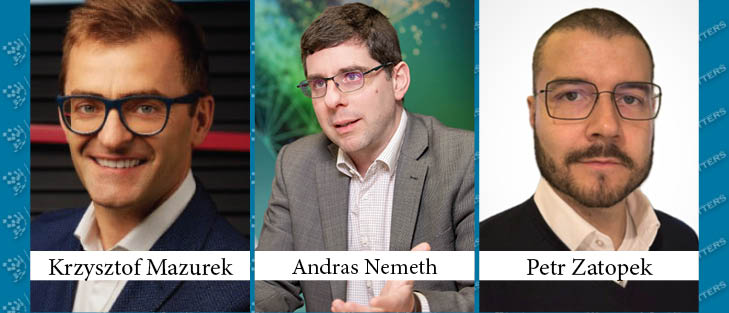More and more legal departments are actively integrating methodologies from disciplines outside the traditional legal sphere, such as project management and even engineering. This evolution is reshaping how legal teams deliver value, emphasizing both strategic impact and operational efficiency. Precision Medicine Group Deputy General Counsel Krzysztof Mazurek, Alpekr Managing Director Petr Zatopek, and Audax Head of Legal Andras Nemeth took a look at the vital role of cross-disciplinary skills in modern legal at the CEE Legal Matters GC Summit, held in Warsaw on April 25-26, 2024.
Integrating Project Management into Legal Operations
Zatopek’s presentation on Legal Project Management for GCs underscored the critical need for project management skills within legal practices. He emphasized the necessity of anticipatory strategizing to enhance operational efficiency, stating that “proactive planning is essential for project success. By investing time upfront, we can achieve greater operational efficiency compared to a reactive approach.” He illustrated this point by emphasizing that front-end planning is superior to damage control once problems arise. “Engaging key stakeholders throughout the process promotes transparency and minimizes disruptions. This ensures everyone is informed and avoids last-minute inquiries.”
Additionally, Zatopek discussed the strategic use of modern aids and technologies to streamline legal operations, highlighting the role of digital tools like Asana and Monday. He noted their utility in creating accessibility and minimizing disruptions, saying that “utilizing accessible digital tools like Asana or Monday empowers the business to track progress and reduces unnecessary interruptions, allowing legal teams to focus on core competencies.” By adopting these tools, legal teams can focus on substantive legal tasks rather than being bogged down by administrative burdens, Zatopek highlighted.
Crucially, tackling the mechanics of project management, Zatopek stressed that “a clearly defined project in the legal sphere requires a defined start, scope, and budget. This structured approach streamlines operations and facilitates expectation management.”
Cultivating a “Get It Done” Culture
Mazurek’s insights from The GC and a ‘Get it Done’ Culture presentation highlight the importance of an effective management culture in legal settings. He discussed the challenge of managing an extensive volume of legal work across different jurisdictions, reflecting on the express production of laws and the resultant pressures. “The rapid pace of legal change creates a challenge, as new laws are often enacted faster than law firms can disseminate updates.” His response is a strategic focus on prioritization, essential for managing swift-paced legal environments that appear to be the norm across jurisdictions.
Mazurek also spoke about the resource challenges within organizations. He argued for a practical approach to legal practice, advocating for acceptance of imperfection and practicality over perfection. “A pragmatic mindset is essential,” he suggested. “Instead of aiming for academic excellence, prioritized practicality and transparent communication are key in managing expectations. We strive to deliver solutions that are effective and meet business needs.”
Moreover, Mazurek emphasized the need for legal teams to look beyond legal and embrace non-legal competencies. Integrating data analysis, project management, and information technology competencies into legal teams makes them better integrated within broader business processes. Moreover, he added that, “in a fast-paced digitally-driven world, lawyers need to look beyond what they were taught at universities and, similar to their business colleagues, build a broad competency portfolio to be business partners.”
Learning from Engineering: Efficiency in Legal Practice
Nemeth’s presentation, Benchmarking Engineers for the In-House Legal Function, offered insights into how engineering principles can optimize legal operations. He discussed the integration of systematic problem-solving and efficiency principles, such as the Pareto Principle, or the 80/20 rule, which can significantly enhance productivity by focusing on the tasks that provide the most substantial impact. Nemeth further explained the practical application of these principles. “The work breakdown structure, or WBS, involves creating a detailed list of tasks, which is instrumental for efficient project management,” he said, going on to describe how breaking down projects into smaller, manageable parts is crucial for efficiency. “Utilizing a WBS for complex legal matters simplifies the process, enhances manageability, and fosters better understanding and compliance among business stakeholders,” he explained.
As another example, Nemeth highlighted the concept of the Eisenhower Matrix as a strategic tool for prioritizing legal tasks. He emphasized its utility in distinguishing between tasks that are urgent and those that are important – a crucial differentiation. “Utilizing the Eisenhower Matrix allows our team to delegate and prioritize tasks more effectively, ensuring that we focus on what truly drives our legal projects forward,” he explained. “By categorizing tasks into ‘urgent and important,’ ‘important but not urgent,’ ‘urgent but not important,’ and ‘neither urgent nor important,’ we can streamline our workflow and allocate our resources more efficiently.” This approach allows the team to prioritize more effectively, thus ensuring an optimal allocation of resources and making sure that the tasks with the nearest deadline are pursued with more urgency.
Nemeth advocated for simplicity and effective communication in legal processes, adopting the KISS (Keep It Simple, Stupid) principle commonly used in engineering. “Clear and measurable benchmarks are essential for effective project management. This facilitates tracking progress and ensuring successful outcomes,” he explained, adding that there is much truth in the old adage: if it cannot be measured, it cannot be managed. This approach underlines the importance of clarity and straightforwardness in legal documentation and client communications, which are crucial for preventing misunderstandings and errors, as Nemeth explained.
Embracing a Multi-Disciplinary Approach
The presentations held by Zatopek, Mazurek, and Nemeth collectively underscored the need for integrating skills from various disciplines into legal practices. Whether it’s project management, strategic prioritization, or engineering efficiency, these cross-disciplinary skills are crucial for modern legal practitioners facing an increasingly complex world.
The legal profession is no longer solely about understanding and interpreting the law; it also involves managing projects, optimizing processes, and enhancing efficiency through technology. To effectively meet the challenges of modern legal environments, legal professionals must acquire a broad set of cross-disciplinary skills. Embracing these skills can make legal practices more adaptable, efficient, and capable of driving business success in dynamic and complex industries, sectors, and markets.



